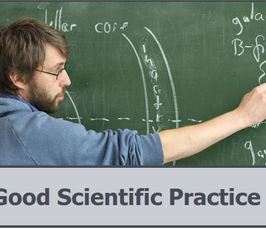Good Scientific Practice for PhD students
IMPRS-UFAST Ph.D. Seminar
- Date: Mar 1, 2018
- Time: 09:30 AM - 05:30 PM (Local Time Germany)
- Speaker: Alexander Schiller (Friedrich-Schiller-Universität Jena)
- Location: CFEL (Bldg. 99)
- Room: Seminar Room V, O1.109
- Host: CUI, IMPRS-FAST, PIER, DESY, PHGS, MIN-UHH

In public, "good scientific practice" is often connected with cases of plagiarism when it comes to dissertations. However, the important topic covers a substatially wider spectrum of scientific conduct: Dealing with data (including checking, recording, ownership and storage), the publishing process and authorship, responsible supervision, academic cooperation, conflicts of interest and dealing with conflicts. Inappropriate academic behaviour includes inventing or faking data, violating intellectual property (theft of ideas or plagiarism) and sabotating the research of others. More subtle topics, such as skepticism, critical thinking, reproducibility, handling creativity, the danger of axiomatic assumptions and confirmation bias represent the "heart of good scientific practice". Every PhD student should have a professional understanding of all mentioned topics.
AIM OF THE TRAINING
- To provide PhD students with an opportunity to build their understanding, skills and confidence in good scientific practice. Take home messages are given as "Four Laws of..."
- Develop investigative strategies/procedures/processes that take account of relevant scientific and other sources of information
- Critically evaluate data, draw conclusions from it, formulate actions and recommend further investigations where appropriate
- Beware of confirmation bias in planning, pursuing and analizing experiments
- Provide clear reports using appropriate methods of analizing, summarising and displaying information
- Be scientifically specialized, i.e. find your topic/role
- Balance out indipendence and plan long term
- Collaborations focus on assertiveness and relationship
- Generate convincing presentations
METHOD
A balanced and
structured program of interactive lectures, challenging activities
outside the "comfort zone" and review sessions will provide a variety of
first-hand learning situations allowing participants to identify and
take away relevant lessons (e.g. with Practical Advice Cards).
Facilitators are habilitated scientists and successful group leaders in
the natural sciences. They are "Certified Facilitators" with the concept
of www.thiagi.com.